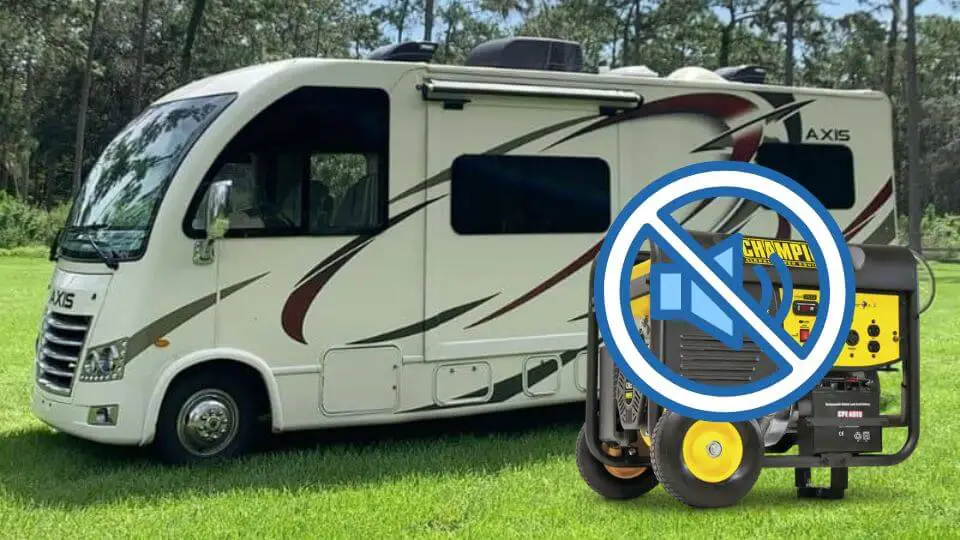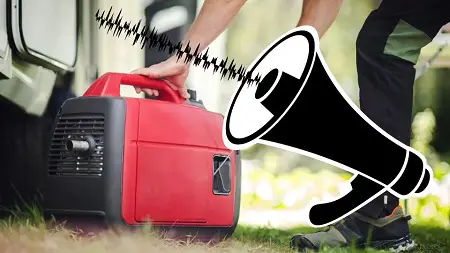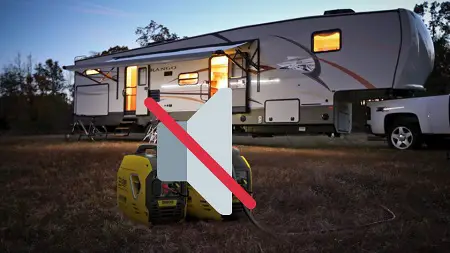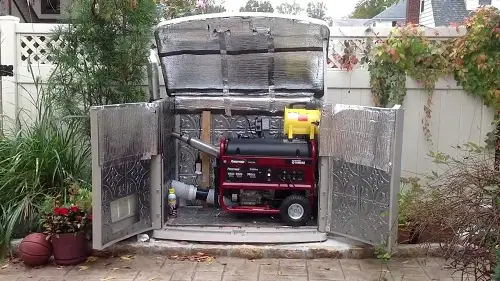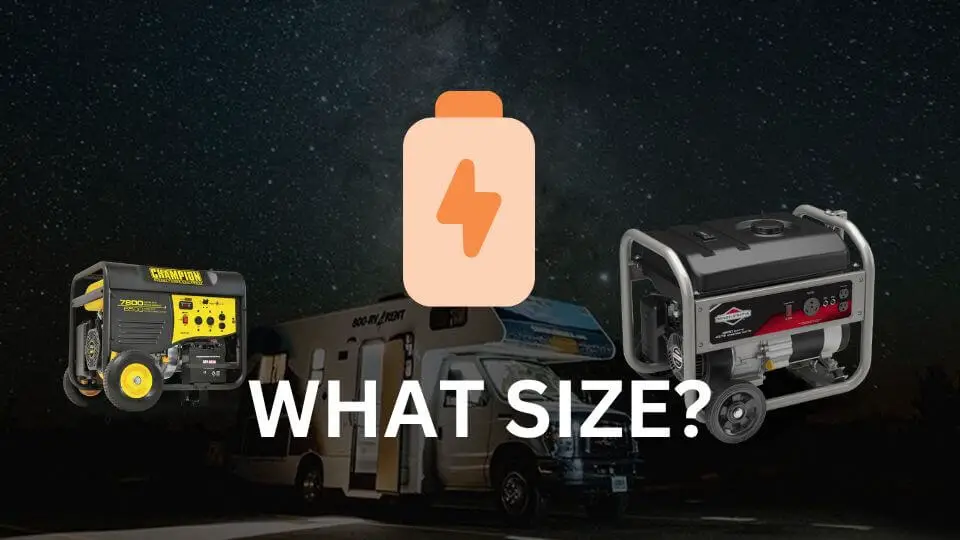This post may contain affiliate links. As an affiliate, we earn from qualifying purchases. We get commissions for purchases made through links in this post.
How to silence a portable generator is one of the most frequent questions, especially for those of you who need to use it in places where noise is not welcome. Whether you’re camping, tailgating, or living off the grid, a loud generator can be a nuisance to you or your neighbors. Fortunately, there are several ways to reduce the noise levels of your portable generator without compromising its performance.
One of the easiest ways to silence a portable generator is to reposition its exhaust pipe. When the exhaust pipe is facing away from you, it’s less noisy. The position of the generator actually affects how much you hear it, especially when you’re camping. When you set up the generator, ensure its exhaust pipe is facing in the opposite direction of you and your campsite. Another factor to consider when positioning your generator is the type of material on which it is placed. If you put your generator on a metal bench, it is going to be louder. Therefore, it’s recommended to place it on a rubber mat or a wooden surface to reduce the noise levels.
In this article, we’ll explore some of the most effective ways to silence a portable generator. From simple adjustments to more complex installations, we’ll cover everything you need to know to make your generator quieter. Whether you’re a seasoned motorhome traveler or a first-time generator user, this guide will provide you with the knowledge and tools to make your portable generator less noisy, so you can enjoy your outdoor activities without disturbing others.
Why are portable generators so noisy?
Portable generators are a common source of power in situations where the grid is down or unavailable. However, they are also known for being extremely noisy. There are several reasons why portable generators produce so much noise:
- Engine RPM: The engine RPM of a portable generator is one of the main factors that may increase its noise level. The faster the engine runs, the louder the generator will be. The engine speed depends mostly on how big of a load you put on a generator.
- Exhaust System: Many portable generators are designed with a simple exhaust system that does not include a muffler. This leads to a lot of noise being produced by the generator. Adding a muffler to the exhaust system can significantly reduce the noise level of a generator.
- Vibration: Portable generators are often placed on uneven surfaces, which can cause them to vibrate. This vibration can create a lot of noise, especially if the generator is placed on a hard surface like concrete or metal.
- Size: The size of the generator can also influence its noise level. Smaller generators tend to be louder than larger generators because they have to work harder to produce the same amount of power.
Overall, the noise level of a portable generator is influenced by several factors. While it is impossible to completely eliminate the noise produced by a generator, there are several steps that can be taken to reduce it.
Can You Quiet a Portable Generator?
Portable generators are a great source of backup power during power outages or when camping in remote locations. However, the noise generated by these machines can be a major source of disturbance. The question is, can you make a portable generator quieter?
The short answer is yes, you can. There are several ways to reduce the noise emitted by a portable generator, including repositioning the exhaust pipe, using sound deflectors, covering it with a special box, and using a generator muffler.
It is important to note that while you can reduce the noise produced by a portable generator, you cannot completely eliminate it. Portable generators run on an internal combustion engine which will create more or less noise. Depending on a generator’s size, design, and mode, some of them can be louder than others.
In addition, it is important to ensure that any modifications made to the generator do not compromise its safety or performance. For example, modifying the exhaust system can affect the emission levels of the generator and may result in a violation of local laws and regulations.
Overall, while you can quiet a portable generator to some extent, it is important to balance noise reduction with safety and performance considerations.
Soundproofing the Generator
When it comes to reducing the noise from a portable generator, soundproofing is one of the most effective methods. There are different ways to soundproof a generator, and two of the most common methods are using soundproof boxes and installing acoustic panels.
Using Soundproof Boxes
One of the easiest ways to soundproof a generator is by using a soundproof box. These boxes are designed to fit over the generator and reduce the noise it produces. The box is made of sound-absorbing materials that trap the noise inside, making it quieter. Here are some things to consider when using a soundproof box:
- Size: Make sure the box is the right size for your generator.
- Ventilation: Ensure that the box has adequate ventilation to prevent overheating.
- Materials: Choose a box made of high-quality materials that can withstand rain and snow.
Installing Acoustic Panels
Another way to soundproof a generator is by installing acoustic panels. These panels are designed to absorb sound waves and reduce the noise produced by the generator. Here are some things to consider when installing acoustic panels:
- Placement: Install the panels around the generator to create a sound barrier.
- Materials: Choose panels made of high-quality sound-absorbing materials.
- Size: Make sure the panels are the right size for the space you are soundproofing.
Overall, soundproofing a generator is an effective way to reduce the noise it produces. Whether you choose to use a soundproof box or install acoustic panels, it is important to consider the size, ventilation, and materials used to ensure the best results.
Can You Put a Quieter Muffler on a Generator?
When it comes to reducing the noise level of a generator, one of the most effective solutions is to install a quieter muffler. But can you put a quieter muffler on a generator? The answer is yes, and it is a relatively easy task.
- For 7000W 7500W 8000W 8500W 420CC 11HP 13HP Gas Generator
- For Harbor Freight Predator 13HP 420cc 7250 9000 Watts Generator
- For Harbor Predator 8HP 301cc 5500W 6500W Generator 63966 63964
- For Harbor Predator 13HP 420cc 6500W Gas Generator 63082 63083
- For Champion 5000W 6000W 6250W 7500W 8000W 8500W 9200W Generator
Choosing the Right Muffler
The first step to installing a quieter muffler on your generator is to choose the right muffler. There are many different types of mufflers available on the market, each with its own set of features and benefits. Some mufflers are designed specifically for use with generators and are engineered to reduce noise levels while maintaining optimal engine performance.
When choosing a muffler, it is important to consider the size and type of your generator’s engine, as well as the level of noise reduction you require. A muffler that is too small or not designed for your generator’s engine may not provide enough noise reduction, while a muffler that is too large may interfere with engine performance.
Proper Installation of Silencers
Once you have chosen the right muffler for your generator, the next step is to properly install it. This involves removing the old muffler and replacing it with the new one, making sure to properly align and secure the muffler in place.
It is also important to install any additional silencers or soundproofing materials as needed to further reduce noise levels. This may include insulation or padding around the muffler or exhaust pipe, as well as the use of vibration-dampening materials to reduce engine noise.
Overall, installing a quieter muffler on your generator can be an effective way to reduce noise levels and improve overall performance. By choosing the right muffler and properly installing it, you can enjoy a quieter and more efficient generator that meets your power needs without disturbing your neighbors or causing undue noise pollution.
How to Make a Silencer Box for a Generator
To reduce the noise produced by a portable generator, one effective solution is to build a silencer box. Here are the steps to follow to make a silencer box for a generator:
- Measure the dimensions of the silencer box: To achieve the silencer box, you need to measure the space your generator silencer box will occupy accurately. Be sure to leave a few inches on each side of the box to cater to the insulation thickness and the ventilation aspects.
- Create provisions for ventilation: Proper ventilation is essential to prevent overheating and ensure the generator runs smoothly. You can create ventilation holes on the sides of the box or use a fan to circulate air.
- Choose the right materials: You need to choose the right materials for your silencer box. Soundproof foam, mass-loaded vinyl, and acoustic insulation are some of the materials you can use to reduce noise. You can also use plywood or MDF to construct the box.
- Construct the box: Cut the pieces of the box from the chosen materials and assemble them using screws and glue. Make sure to create a tight seal between the pieces to prevent noise from escaping.
- Install the exhaust pipe: Attach the exhaust pipe to the box using a rubber connector to prevent vibrations and noise.
- Test the box: Once you have constructed the silencer box, test it to ensure that it is reducing the noise produced by the generator. You can use a decibel meter to measure the noise level before and after installing the box.
By following these steps, you can make a silencer box for your generator and reduce the noise it produces.
How to Make a Generator Quiet for Camping?
When camping, the last thing you want is a noisy generator disrupting the peace and quiet of nature. Fortunately, there are several ways to make a generator quieter for camping. Here are some tips:
- Reposition of the Generator: The position of the generator can affect how much noise it produces. When setting up the generator, make sure the exhaust pipe is facing away from your campsite. This will help to reduce the noise level.
- Use a Soundproof Enclosure: A soundproof enclosure is an effective way to reduce generator noise. It is a box made of sound-absorbing materials that can be placed over the generator. The enclosure will trap the noise and prevent it from escaping, making the generator much quieter.
- Install a Muffler: A muffler is a device that reduces the noise level of an engine by decreasing the exhaust flow. Installing a muffler on the generator can significantly reduce the noise level.
- Use a Generator with a Low Decibel Rating: When shopping for a generator, look for one with a low decibel rating. A decibel rating is a measure of the noise level of the generator. The lower the decibel rating, the quieter the generator will be.
- Do not Put a High Load on Your Generator: A generator will operate quieter when it has less load when compared to a fully-loaded generator. Try to not use too many devices simultaneously from the same generator. Be especially careful when using high-demanding appliances like fridges, microwaves, or ACs.
- Use a Generator with Inverter Technology: Generators with inverter technology are designed to be quieter than traditional generators. They are also more fuel-efficient and produce cleaner power.
By following these tips, campers can enjoy the benefits of having a generator without disturbing the peace and quiet of nature.
Are Inverter Generators Quieter Than Generators?
Inverter generators are generally quieter than traditional generators due to their innovative technology. Unlike conventional generators that run at a constant speed, inverter generators adjust their speed according to the required power output. This means that they can run at a lower speed when less power is needed, resulting in less noise.
According to Consumer Reports, inverter generators produce an average of 64 decibels (dB) at a distance of 23 feet, which is about the same noise level as a normal conversation. In comparison, traditional generators can produce anywhere from 70 to 100 dB, which is significantly louder.
- 【 DUAL FUEL OUTPUT】 312cc 4-stroke OHV engine produces 6000 peak watts and 5250 rated watts with 3.6 gallon fuel tank; Gas or Propane Powered...
- 【 EASY TO CARRY AND USE】 1 telescopic rod and 2 rolling wheels for easy travel; Light weight and compact design, weight only 117.9 pounds; 5...
- 【 Extremely Quiet, Extremely Fuel Efficient】 As Low as 62 dBA Noise with 25%loading at 23 feet distance. Features “LOW IDLE Mode” for...
- 【CO DETECT】Automatically turns off the generator when an unsafe level of carbon monoxide is detected.
- 【 INVERTER TECHNOLOGY】 Provides clean, stable power <3%THD for sensitive electronics including televisions and computers.
Inverter generators also tend to have better sound insulation and mufflers compared to traditional generators, which further reduces their noise levels. Additionally, some inverter generators come with an “eco-mode” or “quiet mode” feature that reduces the noise they produce even more.
However, it is important to note that not all inverter generators are created equal. Some models can still produce significant noise levels, especially when operating at maximum power output. It is important to research and compare different models to find the quietest inverter generator that meets your power needs.
Overall, inverter generators are generally quieter than traditional generators due to their innovative technology and better sound insulation. However, noise levels can still vary between different models, so it is important to do your research before making a purchase.
Conclusion
In conclusion, there are several ways to silence a portable generator and reduce its noise output. One of the simplest methods is to place the generator further away from the camping area or use a soundproof tent. Additionally, using a water bucket, repositioning the exhaust pipe, and selecting proper flooring for the generator can also help reduce noise levels.
Another effective way to silence a portable generator is to use a muffler or a silencer. It is important to choose the right type of muffler for your generator and ensure it is installed correctly. Regular maintenance and cleaning of the generator can also help reduce noise levels and ensure it runs smoothly.
It is important to note that while these methods can help reduce noise levels, they may not completely silence the generator. It is also important to follow safety guidelines and manufacturer instructions when using and maintaining the generator.
By implementing these tips and techniques, you can enjoy a peaceful camping trip without disturbing the natural surroundings or other campers.

